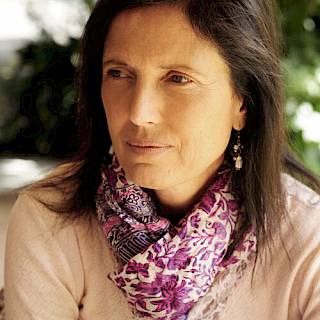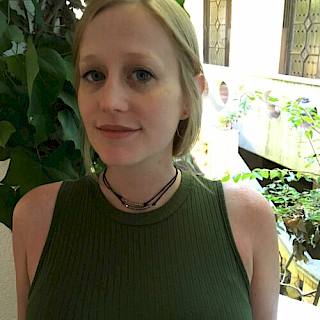Exclusive Extract: A Little Luck by Claudia Piñeiro
To mark Women in Translation month, and in anticipation of our interview with Claudia Piñeiro in our forthcoming autumn issue Wasafiri 115, we're pleased to share an exclusive extract from A Little Luck, Piñeiro's new novel translated by Frances Riddle and published by Charco Press. Read this gripping excerpt and keep your eyes peeled for Wasafiri 115 preorders – and more from the Argentinian author on detective fiction, abortion, motherhood, and religion. And if you're a reader and supporter of work by women in translation, consider purchasing our Translating Lives bundle, or subscribe anytime in the month of August to receive a complimentary copy of Wasafiri 102: Japan: Literatures of Remembering with your print subscription.
I cry, inconsolably, hugging my legs. I cry out my contact lenses, gripping my tortoiseshell glasses in case I need to put them on to see something. But I don’t need to see, just to cry. I cry loudly, my body making movements that look like convulsions. I’m hyperventilating. And then I stop, take a deep breath, try to control my breathing and return to a state of calm that seems impossible to achieve. But just when I think I’m back in control, I start crying again. Hours pass. I can tell because the light on the balcony changes, imperceptibly at first, then more obviously, until little by little lights and shadows establish a new equilibrium. The afternoon light fades into deep night, and later the dawn once again restores contours, treetops, a sign that flickers due to some electrical glitch. I don’t know if I slept at all. Or if I sat here awake. My eyes sting so badly I don’t think I can put my contacts in. If I somehow manage to scrape myself off this floor and face the day ahead of me, I’ll wear the ugly, thick glasses that will put more distance between me and my son. I rub my eyes, they sting as if my corneas were lined with splinters stabbing into my brain. And I realize that, despite the pain, I’ll have to put in my contacts, because I’m now Mary Lohan, not Marilé, and I don’t have blue eyes any more. I have to put in those contacts because I have to face my son with brown eyes, with eyes that he’s never seen. I unfold my arms from around my legs and run my hands over my chest, my shoulders, up and down my arms in an attempt to warm myself. I know I have to pull myself up off this cold balcony that digs into my tailbone. That I have to take a shower. Get dressed. Put in my contacts. Pick up my folders, my purse, act like nothing happened at Saint Peter’s. But I don’t know if I can. As soon as I try, I might fall right back down onto this floor, and nothing will be able to get me up.
The doorbell rings. I don’t answer it. It rings again. Whoever’s there is so insistent that I finally gather the energy to stand, put on my glasses, and walk to the door to see who it is. I open it a crack without removing the chain, it’s the doorman. He cheerfully informs me that he has good news. I remove the chain and open the door a little wider, but I don’t invite him in. He stares at my glasses but doesn’t say anything. Then he smiles widely and starts speaking quickly, moving his hands, gesticulating, pointing to the balcony, probably telling me that he’s solved the mystery of the droppings but I only deduce this because I’m not listening; I can hear his voice but I don’t understand the words he’s saying. I want to cry but I can’t because there’s a man in front of me talking non-stop about the droppings on the balcony where I spent all night shivering with cold thinking about my son. I finally catch one word: poo. He says ‘poo’ and then ‘mess’, but I transform his words into ‘droppings’, as if it were a translation of a novel written in some other language. Droppings. Until at some point the doorman looks at me and something in my eyes, even through the thick lenses, makes him stop. He stares at me but doesn’t have the nerve to ask if there’s something wrong. I take off my glasses and I look at him. ‘I had a problem with my contacts and my eyes are irritated.’ The doorman seems relieved. I don’t know if he believes me, but he’s relieved anyway. ‘They’re blue,’ he says. ‘What are?’ I ask. ‘Your eyes, sorry, from so much... Sorry, your eyes have turned blue.’ Embarrassed, he tries to escape his own words. He walks into the apartment without asking for permission and goes directly to the balcony. He points to the moulding above our heads, ‘You know what that is right there?’ he says and he smiles. ‘Wood,’ I say. ‘Behind the wood, ma’am,’ he laughs as if he’s told a joke. ‘I don’t know what’s behind it.’ ‘A little bat’s made a nest in there. I suspected it and then yesterday when I tapped the wood it squealed like a rat, the little devil. Easy to fix, ma’am, I’ll pour some poison in, seal it off at the top and bottom, and in a couple of days it’ll be dead. It’ll be trapped in there until it dies.’ Trapped to death, unable to get out. I hear the sound of an alarm bell and a train approaching. I cry. I can cry now, even with this man standing here in front of me. I cover my face with my hands. I clumsily wipe at my tears, only spreading the dampness around my face. The doorman is unsettled, he knows what to do about a bat who’s made a nest on the balcony but not about a crying woman. He reaches out to place a hand on my shoulder but stops himself. ‘Don’t worry, I’ll take care of it,’ he says in an attempt to calm me. ‘It’s not that,’ I say, but he doesn’t hear me. ‘You’re scared, all women are scared of bats,’ he tells me and I don’t say anything because I don’t care about women and their fears, only about this little bat who has just learned to fly and who’s now going to be trapped in there, unable to get out, awaiting its death sentence. ‘I can bring the poison and the caulk up right now and we’ll solve the problem straight away. It’ll dry right up like a leaf, I promise,’ he says. And I repeat his words: ‘It’s going to be trapped in there, it won’t be able to get out, dry as a leaf.’ I start crying again. The doorman is made even more nervous by the fact that the solution he offered to soothe me has had the opposite effect. He looks down to the street to avoid looking at me, unsure whether he should say something, leave, or wait for me to collect myself. I know the man wants to go, to run away, to escape my emotions. ‘No, not again,’ I say firmly, but he doesn’t understand. How could the doorman possibly understand. Did my son understand? I reach up to the wooden moulding, I knock on it like the man says he knocked the day before. The animal squeals. ‘See,’ he says, ‘there it is.’ I spin around to face him, furious: ‘I won’t allow it.’ The doorman is even more confused, this situation doesn’t fit into his universe of possibilities. ‘It’s a bat,’ he says. ‘I don’t want you to leave it trapped in there,’ I say. And then I shout: ‘I won’t let it die trapped in there!’ The doorman is alarmed, and, like a child who’s been scolded, says: ‘Okay, okay, fine, whatever you want, I don’t care about the bat shit, it’s on your balcony, not mine. Sorry... excuse my language,’ he adds, as if ‘poo’ had been pushing the limits but ‘shit’ was a word of another order, something you had to apologize for. We stood there, both of us silent, for what felt like an eternity. Much longer than the awkward twenty-three-second silence Robert talked about. Finally the man says: ‘Or I could smoke it out then seal the hole up and it’ll find another place to make a nest. Would that be all right with you?’ I tell him I’m not sure, to let me think about it. I feel like crying again but I clench my throat closed and hold it in. ‘Well, just let me know,’ he says and he takes that moment of tentative resolution as his chance to escape. ‘I’ll let you know,’ I say.


